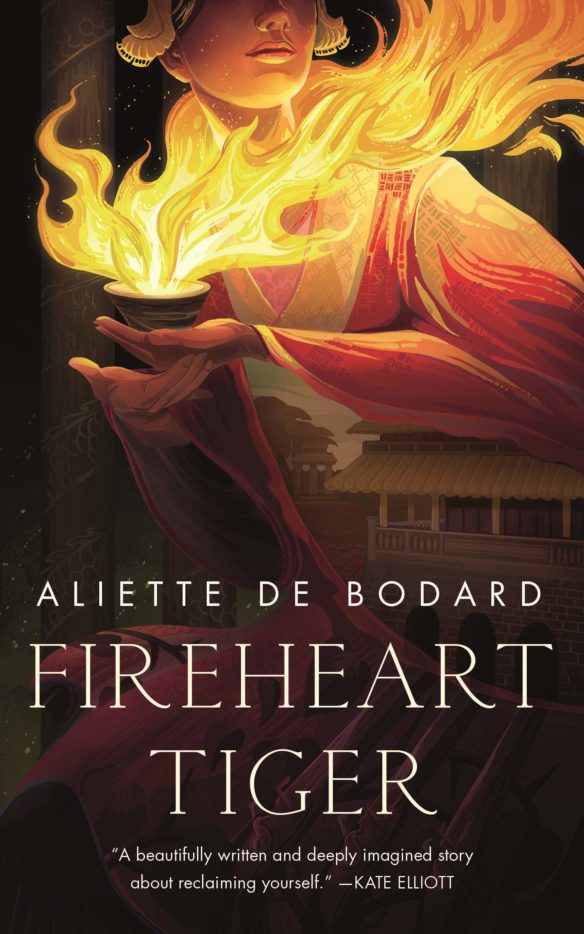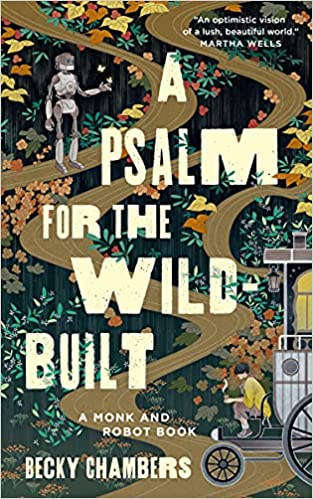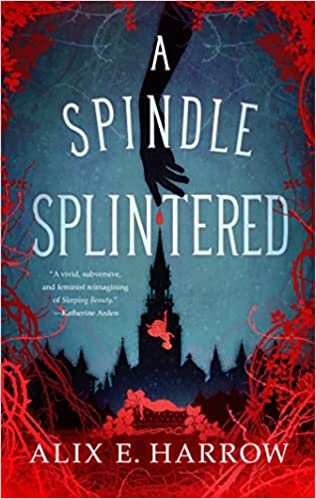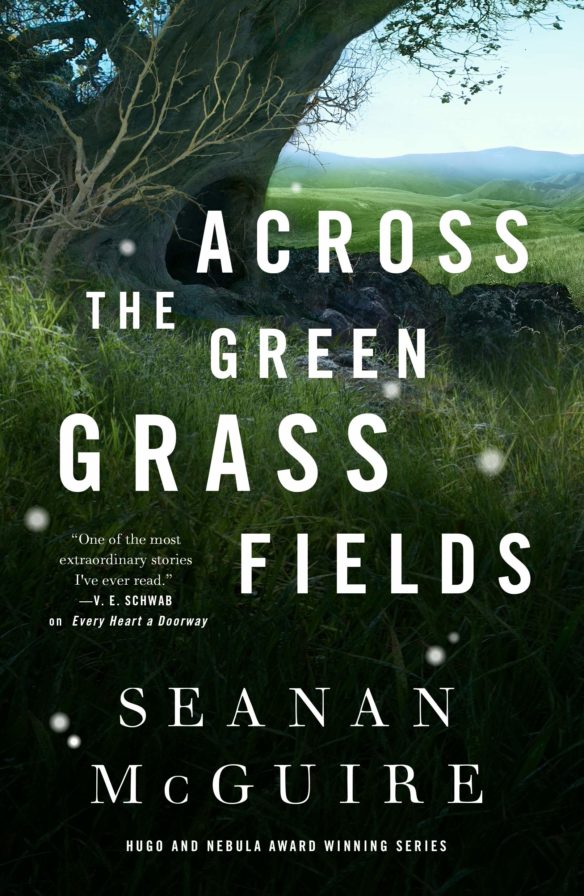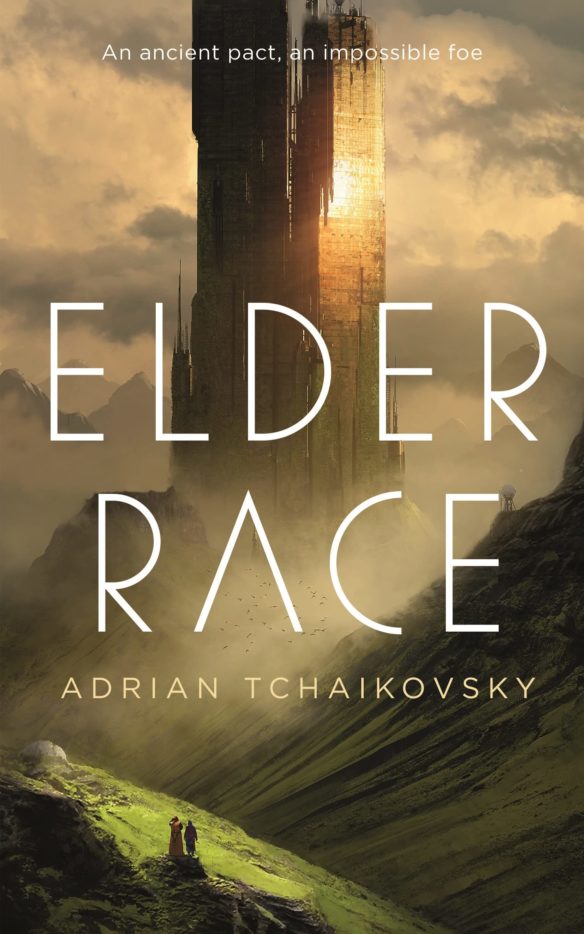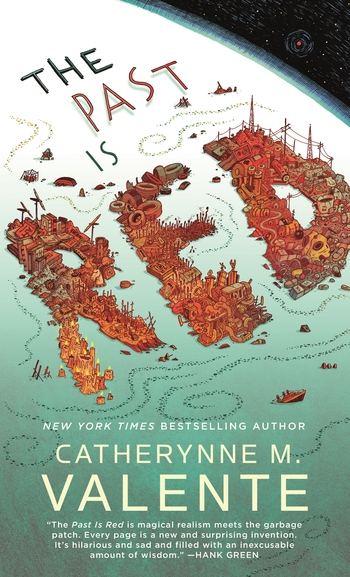By Michaele Jordan: Friends, as I’ve mentioned in previous years, I always read all the Hugo nominees. Usually I do this as soon as the nominees are announced. But this year, maybe because I was so focused on the Fan Writer Hugo (You rock, Chris!), I didn’t get to it in time. So I’m reading them now.
But I didn’t cheat. I pulled a list of the nominees in plain text, without the underlining that marked the winners. I’ve always read the candidates without knowing who would win. Why should this year be different?
I’ll start with the novellas, because they were mostly available in book form at the library, and since they’re short, I can finish them quickly. So here we go.
Even Though I Knew the End by C.L. Polk (Tordotcom)
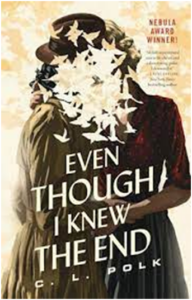
This book presents itself as a detective story. But for me, the biggest mystery in this book was the mystery of what the title was supposed to mean. There is, I admit, a scene in which the protagonist, Helen, sits down on the sofa and watches an old movie, “even though,” she remarks, “I knew the end.”
The scene itself does not appear to be important, just there for mood or characterization. We don’t learn what the movie was, or whether Helen liked it or not. She appears to be just killing time. It’s never referred to again. In fact, less attention is paid to that movie than to the numerous cups of coffee she consumes. Helen is particular about coffee.
I believe Mx. Polk focused on that coffee specifically to establish Helen as a typical noir detective – smart, world-weary and unflappable. Helen just happens to be an auspex, or a magical detective. She receives a commission from a mysterious beautiful woman, and goes to work investigating a particularly horrific serial killer.
At the crime scene, Helen is confronted by a team of magical authorities. The unflappable world-weary pose drops like a rock. She becomes a heart-broken woman, desperate to reconcile with one of the magic-cops, who hates her for some as-yet-unrevealed offense. (Mx. Polk does like to juggle tropes; their characters change like a cage full of chameleons.) What with the yearning looks, and the frigid resistance, we are led to suspect a tragic romance, torn apart by some misunderstanding which will eventually be resolved by a little honesty.
But no. That’s not it. Soon we will meet Edith, and Helen will turn into a deeply caring, romantic lover, who wants nothing in the world so much as to escape all this darkness, and run away with her true love, only. . . she can’t. She has a dreadful secret.
She has only a few days to live. Now that, we probably didn’t see coming. It turns out that our warm-hearted, honorable, caring protagonist sold her soul to the devil ten years earlier, and her contract is nearly up. I admit that I would not normally expect someone with no soul to be warm-hearted, honorable and caring, but this is a different world.
Apparently here, your soul has nothing to do with your character – it’s just a thing. Sort of a ticket stub to get you into heaven (which is real, and so sublime that anybody brought back from there to life will hold a permanent grudge.) A world so different from ours that angels can be serial killers, and the most reliable, trustworthy character in the book is a demon. There is nothing in this ‘mystery’ that a reader can hope to solve, since no human rules apply, and all the clues are magical artifacts never heard of in our mundane reality. Just gotta hope you love the miasma.
Into the Riverlands by Nghi Vo (Tordotcom)
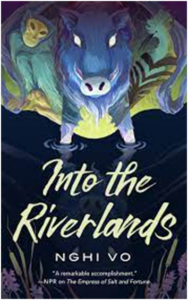
This story is strangely reminiscent of The Canterbury Tales. In the Chaucer, a large group of pilgrims are travelling together to the shrine of Thomas Becket (who got sainted for pissing off his drinking buddy (the king) when he turned into a Jesus freak). They pass the time with a storytelling contest. Into the Riverlands follows a good natured (gender-free) cleric named Chih who picks up some travelling companions on their way to Betony Dock, and they, too, tell each other stories along the way.
The resemblance ends there. The Riverside party is much smaller. And Chaucer didn’t include bandits or martial artists, as does Ms. Vo.
This book is the third in the Singing Hills cycle – all featuring Cleric Chih of the Singing Hills Abbey – following The Empress of Salt and Fortune and When the Tiger Came Down the Mountain. The liner notes assure me that the books can be read independently, in no particular order. This is true. I skipped the liner notes, and never noticed that I had landed in a series.
Chih is a gentle, easygoing person. They are a peacemaker, with no fighting skills. Their abbey is more concerned with the preservation of history than the observance of ritual, and Chih takes that calling very seriously, travelling extensively in search of more historical tales. They are assisted in their work by their companion, Almost Brilliant, who looks like a beautiful bird, except it talks, and is a brilliant scholar with total recall. As you might guess, the book is a bit episodic, but not unpleasantly so. Just the opposite. It is charming, and I recommend it.
Mirror Mended by Alix E. Harrow (Tordotcom)
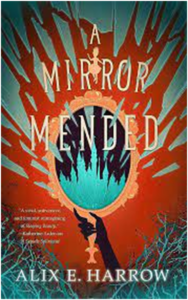
This book is a sequel to A Spindle Splintered by Alix E. Harrow, which took the best novella Hugo in 2022. I remarked then that it had a truly splendid, heartrending opening, but the very act of launching into the story resolved Sleeping Beauty’s initial peril, leaving the story with nowhere to go. The ending was ineffectual. Some magic gets thrown around, everybody’s problems are fixed, except for the protagonist, and she decides that maybe she’ll become a magical superhero rescuing timid princesses. I confess, I was extremely surprised that it took the Hugo.
But that was then. Over a year ago. Picking up A Mirror Mended, I again skipped the liner notes, and dove in. And it’s Sleeping Beauty again. Already I’m rolling my eyes. Is this the new thing? Are we going to get story after story after story about Sleeping Beauty, until she’s as tired as vampires? Very slowly it dawns on me that this is a sequel.
NOT a good idea. Ms. Harrow had already run out of things to say about Sleeping Beauty half way through the first book. You remember (from two paragraphs back) that the protagonist had decided at the end to make a career of rescuing Sleeping Beauty? When A Mirror Mended opens she tells us that she’s done just that. And now she’s bored with it. Excellent! So am I.
So she jumps over to the Snow White story, and decides to rescue the Evil Queen instead, (largely, I suspect, because this particular Snow White is doing a very good job of taking care of herself.) There’s a little shell game with the identity of the Evil Queen, and surprise! one of the Snow Whites IS the Evil Queen.
You may have noticed that my tone has grown a bit snarky. I picked that up from the protagonist. I am sorry to report that I found this to be one of the most heavily padded books I’ve ever slogged through. Virtually nothing really happens, although there is a good deal of running around and being scared. So the author fills in with the protagonist’s voice. She’s very snarky. Except when she’s being sententious. I could go through this whole book, knocking out several whole paragraphs on every page, reducing it to a short story, and nothing of the actual content would be lost.
You are probably getting annoyed with me right now. A lot of people liked this book, or it wouldn’t have made it to the ballot. But I promise I do not intend to insult them. I don’t really understand where they’re coming from but I fully acknowledge that I might well be missing something and I respect their right to their opinion. That said, I didn’t like this book, and wouldn’t have finished it if it hadn’t been a Hugo nominee.
Ogres by Adrian Tchaikovsky (Solaris)

I had a very difficult time getting into this book. Right off the bat, it’s second person, present tense. I am told that many writers feel that a second person narrative draws the reader into the story by making them feel that the author is addressing them personally. Doesn’t work for me, but maybe it does for most other people. I also don’t like present tense. Some writers think that makes the narrative more immediate. But in my experience, most people don’t talk in present tense. (Except maybe a cop calling in, “I am in the alley behind the suspect’s presumed location. Back-up requested.”)
A couple of pages further in, the narrator refers to Roben, the bandit in the woods (who sometimes wears a hood against the rain) and my shoulders hunch. Another Robin Hood mash-up? I haven’t had much luck with those.
But then, the narrator points out that a half-dozen or so half-starved outcasts living in the woods, no matter the weather, is a singularly unattractive life-style, and they’re not getting rich on the proceeds of banditry, either. At best, they earn the silence of the locals by sharing their meager take. I am charmed. Utterly and completely.
The story opens with a small, agricultural village preparing for a visit from their Landlord. The villagers are human. They are small and fragile, timid and poor. The Landlord – like all nobility – is an ogre. Large and cruel and rich off the labor of others.
This, we are assured, is the natural order of things. It’s preached in the churches. There’s even a psalm about it, ” The Master in his castle, the poor man at the gate.”
Sir Peter stands maybe nine feet tall, and is correspondingly broad. Other than that, he looks like a human. He’s brought his son Gerald along, to learn the business of managing an estate. He is greeted – so very politely – by the Headman of the village, who has also brought along his son, Torquell.
Torquell is only six feet tall, but that’s big for a human. And although he’s good natured, he thinks pretty highly of himself. The kowtowing to ogres has always grated on his nerves. Gerald soon decides this uppity villager needs to be taught his place. The situation escalates drastically leaving Gerald dead and Torquell on the run.
He’s captured by a bounty hunter, but just when Sir Peter comes to claim him – rubbing his hands together as he plots a gruesome execution – the ogress Isadora appears on the scene. She is rich and important and very curious about this peculiar human. She buys Torquell right out from under Sir Peter. She also turns out to be an astonishingly lenient master. Torquell spends years in her household, being educated and studied.
All of the above is contained in the first seven chapters. It’s told with style and wit, and keeps you turning the pages as fast as you can consume them, even though it’s mostly set-up. But then . . . It’s as if Mr. Tchaikovsky unexpectedly found himself up against a deadline. I can’t help wondering if he had originally intended to make Torquell’s saga another series, but then changed his mind.
The remaining two chapters contain twice the action of the previous seven. They read like a summary of a history book. No more wit. No more personality. Just a list of events spinning by like machine gun fire, only slowing down as the ending – which you DON’T see coming – approaches.
I liked this book, but I didn’t love it. Not Mr. Tchaikovsky’s best work, but good enough for the beach or the airport.
What Moves the Dead by T. Kingfisher (Nightfire)
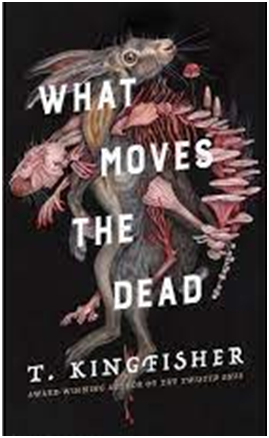
I happened to pick up this book on the same day I watched the last episode of the TV series The Fall of the House of Usher. So it gave me a chuckle to discover that this book was also drawn from the Edgar Allen Poe story The Fall of the House of Usher.
Mind you, the two are nothing alike. The TV series is a total remix. The twins Roderick and Madeleine Usher are not heirs to an ancient (but penniless) name, living in an historic ruin on a lakeshore in the middle of nowhere. They are self-made billionaires, and the cracks in their company’s foundation are moral, not literal. Even so, they are still living on shaky ground.
Neither are they childless (Roderick has six kids – all by different mothers) or solitary. They are celebrities, with their pictures on magazine covers and their names in newspaper headlines. This actually makes their story far more tragic than the original. They have so much more to lose. Their downfall is mythic.
What Moves the Dead is much closer to the original Poe. It places the Usher twins back in their ancient family home – much of which is no longer habitable – located on the shore a lake so dank and murky, it must be called a tarn. The rest of the landscape is equally dismal. Clearly nobody would choose to live there – except Madeleine Usher.
This is where the story veers from the original Poe. We know that Madeleine insists on continuing to live there. She has a viewpoint. She has a voice. Poe’s House of Usher was NOT a character driven piece. It’s entirely about the mood invoked by the setting, about the desolate and ruined house, and all it symbolized in the way of human futility. There are only two characters.
There’s the narrator. You should know that in the early 19th century, the anonymous third person narration was not much used in fiction. It was seen as being for primarily for use in factual content – journalism and educational text, materials where it was unimportant who was speaking. Fiction was written in first person, told by someone associated closely enough with the events to relate them. So Poe’s story had a narrator: Roderick Usher’s old friend, invited to come for a visit. He has no real voice, and certainly has no opinions. He’s just there to describe what happens, and that’s all he does.
The other character is Roderick Usher, who is described in detail. Sickly and solitary, neurotically high -strung, and subject to a number of nervous complaints. It’s a wonder he has even one friend he can invite to bring some cheer into the house. Or perhaps to bear witness. If he didn’t, who would tell the tale?
You will note that I did not include Madeleine as a character. She’s rarely mentioned, beyond Roderick mentioning she’s unwell. She has no lines. We see her pass by once in a corridor. And then Roderick says she had died, and the narrator helps lay her to rest in the family tomb.
But there are characters in What Moves the Dead. Madeleine and Roderick are a long way from normal, but they are real to us. Even the narrator has a voice. Alex Easton – who was invited by Madeleine, not Roderick – is, in fact, a very interesting character. They are Gallacian, and are extremely entertaining on the subject of their homeland. They’re genderless military personnel, (read the book if you want clarification of that ) and carry arms at all times. They worry about their bad tempered horse. They’re an active participant in the story. And from the moment they arrive at the house (which is still pretty horrible even if it’s no longer be the focus of the story,) they are worried sick about both their old friends. For more than one good reason.
And there IS a story in this version of the story. I won’t risk hinting about that story. It’s deliciously complex and unexpected, Yet affectionately faithful to Poe. I recommend this book to everyone.
Where the Drowned Girls Go by Seanan McGuire (Tordotcom)
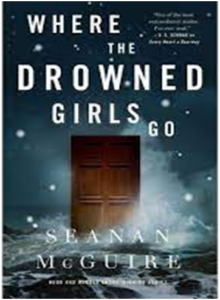
This book started with a VERY interesting premise about schools for children touched by magic. Of course, we’ve all heard about magic schools. But the schools in this book (there are two) are nothing like Hogwarts. In Hogwarts, the students are viewed as gifted, and are being trained to make the most of those gifts. They are acknowledged – and applauded – as special. None of them are less than happy to be there.
But in this book, the schools are reform schools for children who have strayed from reality. Each of these children was already unhappy before they were touched; each felt desperately out of place in their world. And each stumbled on a door, an impossible door, in a place where no door belonged. And because they were unhappy, and felt out of place, they opened that door.
In most books, that is where the story starts. This beginning is followed by a tale of magical adventure, in which wrongs are righted and lessons learned. At the end, some children return to their original homes, better equipped to face that reality. Or some children, who have no place to go back to, remain in the magical lands and build new lives.
But not this time. The children who stepped through the doors find many different magical lands: water worlds, fairy lands, candy lands. They had adventures. Maybe some children stayed on when their adventures were completed, but a lot of them – the ones this story is about – ended up stumbling through magic doors that led them back to that original home where they had already been unhappy and maladjusted. Their travels have NOT prepared them to deal with those old issues. Instead, these children are even further severed from their native reality.
It’s a fairly common occurrence in the world where this story occurs. Often enough that there are schools for these special children. There’s Eleanor West’s Home for Wayward Children, and there’s the Whitethorn Institute. And that’s where this story begins.
I confess, I did not find this book unflawed. Ms. McGuire has an extensive cast of characters, and since each has a different story, each occasionally takes the lead as the viewpoint character. There’s nothing wrong with that – the characters are all well drawn. But the shifting of viewpoint is irregular, even erratic. I frequently had to stop, and figure out who was talking now. It could have been better handled.
Also, I believe the ending was intended to be open-ended, to leave the characters in place for their new lives. But the set-up didn’t work for me. It seemed to me that the story just drifted vaguely away from its climax to a stop, like a car that’s run out of gas.
Please note: I am NOT saying that I didn’t like this book. As I said, the characters are good. The pictures of boarding school life are scary-accurate. The magic is wonderful – subtle yet pervasive, intriguing and original. I do recommend you read it. If I say it’s not quite perfect, I only mean that very few books are genuinely perfect. This one is definitely very good.

